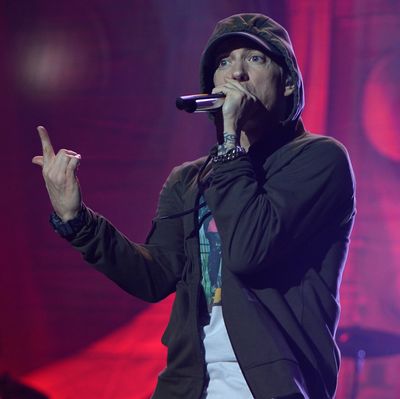
Strange though it seems now, there once was a time when Eminem was ahead of the curve. Back in the early 2000s, he had just completed a trilogy of substantial, hugely successful albums and starred in a major motion picture based on his own life. His fixations — drugs and drug abuse, family and family abuse, conscience — felt vital, though rarely comfortable. Critics and listeners were still generally inclined to approve of him. When, outraged by the Bush administration’s push for war with Iraq, he added politics to his list of fixations, few blinked an eye. “No more blood for oil — we got our own battles to fight on our own soil,” he rapped on 2004’s “Mosh,” a protest song whose music video shows Eminem leading masses of protesters to register to vote.
A deep-seated sense of moral outrage and civic engagement, combined with the knowledge that the cultural conservatives who lusted to ban him were on the other side, drove him forward: He couldn’t escape politics, so he might as well come out as a public representative. On October 26, 2004, two days after the “Mosh” video dropped, he headlined the Shady National Convention in New York City’s Roseland Ballroom. The event was to launch his own Sirius radio channel, but he was channeling politics throughout, its dependence on financial interests and banal rhetoric in particular. A blustering businessman (“Chairman of the Joint Chiefs of Cash”) nominated him, called him a winner. Then Eminem appeared and gave a dull speech long on homilies and short on content. “Americans have been given hills to climb and the strength to climb these hills, and because we have made that hard journey, we can finally see the valley below,” he announced to the whooping crowd. “And what is below that valley, you ask? I don’t know. But nothing will stop us from getting there.”
It’s tempting to view that speech as prophetic in 2017, when “below the valley” seems like an accurate assessment of the state of the nation and the man most responsible for its downward motion is the same man who nominated Eminem to head the Shady party ticket 13 years ago. It’s a past he looks on with regret on “Like Home,” the best track off of his new eighth album, Revival. Eminem reviews his handshake with Donald Trump with regret; he should have spit on his hand, should have anticipated how Trump would eventually try to tear the country apart. Gently produced by Just Blaze, “Like Home” is nothing more or less than a negative review in rhyme of Trump’s first year in office. Trump’s hideously brief attention span, his addiction to right-wing media, his ban on transgender people serving in the military, his hate for people of color and his fondness for Nazis and his equivalence to Hitler — they’re all addressed, as is the heroism of Heather Heyer and the bravery of Colin Kaepernick for standing up to everything Trump represents.
It’s Eminem on his best behavior: There are no detours for potty humor or jokes about sexual assault, and his delivery is warmer and less steroidal than usual for the artist’s late period. For the first time in a long while, he’s spiritually in tune with the Zeitgeist, though musically, the song, with its dreams of uplift and rousing chorus from Alicia Keys, feels like a remix of “Empire State of Mind.” He wants to tell you he hasn’t given up on America, that Trump’s vision of America isn’t the only one on offer: “Let’s hear it for a brand new America without him, and be proud of where we’re from.” One wonders if, after Trump, there’s still a way to extricate American nationalism from its entrenched associations with racism and imperialism, but it’s hard to blame Eminem for making the effort. Even if he’s wrong, his narrative over the past decade — hitting rock bottom, staying there a long while, then slowly returning to some semblance of vitality and hope — could represent the country’s future nonetheless.

